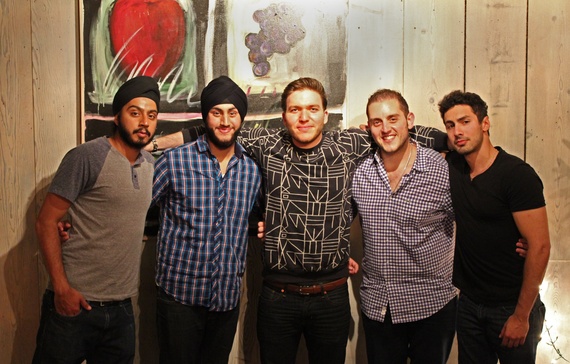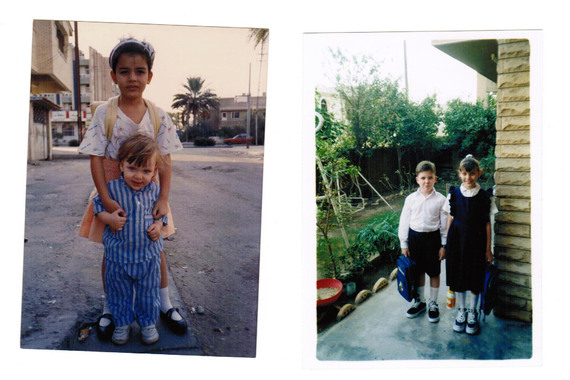Imagine a life where you are not allowed to be creative and you have no idea that you are not living up to your full potential or that a better life is attainable? Despite our daily challenges, few reading this would ever be able to fully understand such a reality.
Martin Hermez, the 21 year-old founder and CEO of Tivvi; a soon to be launched social network mobile application company based in Silicon Valley and his team are among those few. Together, they envision Tivvi will revolutionize the social media space. The 'app'is premised as the evolution of social networking, allowing users a greater level of connectivity and interaction between closed groups of individuals, making social media less about 'me' and more about 'us'.
Martin was born in Baghdadand spent more than half his life under the iron-fist rule of Sadaam Hussein. He grew up with his parents, three (3) sisters and a large extended family. Life under Sadaam was described as suppressed, unimaginative and uninspired, totally crafted and executed in the cold and narcissist vision of one man. A vision that sought to exclude any pillar of freedom, equality and opportunity for all. Instead it embellished a totalitarian approach, with a god-like sense of superiority over the entire population. Sadaam's Iraq required a picture of him on every wall of every building and on the front page of every book, access to the internet was denied and the four (4) state owned TV stations only ran content promoting his philosophies. Creativity was forbidden. Art was not taught or practiced in schools and defiance was severely punished. The embargo against the country prevented any influx of modern technology or real connectivity to the outside world. I guess that's the beauty of a regime in the eyes of the dictator - an environment so far removed that the majority have no idea what the rest of the world is like and are forced to accept the homogeneous minimalist life chosen for them and conditioned into a psychological state that made them unable to conceive rebellion.
Life for Martin was made even more difficult because of the fact that he is a fair skinned with blue eyed Chaldean Christian. As a minority, his family faced consistent harassment as the Muslim conflict tended to spill over to other religions. Their skin color also made them seem like outsiders, not to be trusted. The harsh realities of life became accepted as normal "you learn not to play with the toys laced with explosives left on the sidewalk, once you witness the consequence".
Martin and his immediate family escaped Baghdad via a perilous 12-hour road trip to Jordan, leaving the rest of their family behind. They were one (1) of four hundred (400) families accepted to cross the border of some four thousand (4,000). Months later, on July 4 2003, they arrived in Detroit with one month's rent at their disposal and unable to speak English. Martin was overwhelmed by the fireworks, food and festivity that he thought were in celebration of his arrival to America.
On his first day of school in the US, Martin arrived escorted by his father both dressed in suits, with brief cases in hand - aligned with the strict formalities of Baghdad. He spent months as an outcast, until he met his now best friend and business partner Ishpinder Sahni. Ish taught Martin the tools of survival in the US, himself an outsider and a victim of hate crimes, as a result of his turban. During the aftermath of 9/11 Ish had to be removed from school for fear of being hurt, kids called him 'Osama' and 'Al Queda' even though he is of Indian descent.
Against all odds Martin has done some very amazing things. He started picking up English within 3 months of living in the United States. By age 12 he was a self taught pianist and has played on numerous occasions with the Detroit Symphony Orchestra. Universal Music adapted some of his work for advertising purposes. At age 14, Martin and Ish rewired a Sony PSP to make it touch screen, right around the time Steve Jobs announced the first generation iPhone.
Martin and Ish have connected with 3 other business partners - Kevin George, Shah Noor and Prab Kumar. As life would have it, all share similar stories based on their immigrant roots. They have all faced misguided hate due to 9/11 and have all dealt with being social outcasts.
The great thing is all five (5) partners in Tivvi, each hailing from the hard hit areas of Detroit and Baltimore have managed to overcome their circumstances and tremendous social adversities to become deeply connected outspoken and accomplished individuals. Kevin built the online portal for Michigan Institute of Real Estate as a student there; Shah created several successful businesses including fashion and jewelry lines, and Prab worked as a management consultant at Boston Consulting Group then traveled the world as a music producer and DJ. They aren't a shy bunch by any measure; they are quite the opposite willing to share their stories and their dreams.

The Tivvi Team (From Left to Right): Shah Noor, Ishpinder Sahni, Martin Hermez, Kevin George, Prab Kumar.
After escaping Iraq, Martin's family spent years totally disconnected from their past, unable to connect with the people they left behind. The war fragmented his family drastically; over time some managed to escape to Germany, Turkey, the Netherlands, Australia and New Zealand. After years apart they have slowly reconnected through the instrumentality of technology and social media. Just imagine the elation and joy of a friend request from someone far removed from your reality, someone you really didn't know was still alive? For Martin social interaction is a treasured experience, one that he doesn't take for granted. The freedom to build his own technology takes on a meaning that goes beyond the typical Silicon Valley measure of success.
In my opinion Martin is either the most unlikely founder of a social media company or the most ideal candidate. My understanding from Martin is that under Sadaam, there was almost no such thing as a dream; people had nothing to aspire to - unless they wanted to become the dictator. This underwrites the potential brilliance of Martin's story, unlike Mark Zuckerburg, Steve Jobs or Bill Gates; Martin's childhood was far from ideal for high-level Silicon Valley success. As a part of the generation expected to be the greatest disrupters of the technology space because they have grown up with the Internet and smartphones, Martin is a total mismatch to his peers. On the other hand Martin's desire to create the ultimate social network makes total sense, a quiet response to his past in Iraq where he could never have pursued or imagined being a start-up CEO and where social interaction was a limited privilege he didn't even know to value.
This is what drives Martin's passion to connect people in a way that is free in spirit and interactive, a privilege he was never afforded during his childhood. "If social networking 1.0 was about manifesting your real life identity through an online presence then the next level is about making the experience of sharing more life-like. Tivvi is meant to allow users to express themselves better, as the multi-dimensional beings they are" - Martin Hermez. It seems the WE generation is becoming less concerned with how many followers or likes they can amass and more interested in the opportunity to uniquely connect with others, think 'Snap Chat'. Martin and his team are working to become the ultimate curators of that experience, changing the way you view social media forever.
